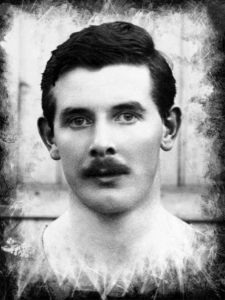 Evelyn Henry Lintott (1883-1916) was born on 2 November 1883 in Godalming, Surrey and was killed serving with the British Army in France on 1 July 1916. Lintott was a talented half back, playing for a number of English clubs before the First World War, and was capped by England at both amateur and professional level.
Evelyn Henry Lintott (1883-1916) was born on 2 November 1883 in Godalming, Surrey and was killed serving with the British Army in France on 1 July 1916. Lintott was a talented half back, playing for a number of English clubs before the First World War, and was capped by England at both amateur and professional level.
Football Career
Lintott began his senior playing career at West Surrey League side Woking during the 1899/1900 season, and would go on to score more than 50 goals for the club over the next three years. In 1905, Lintott moved to Exeter to commence studies in teacher training at St Luke’s Collage, however he maintained a part-time playing career at Woking by returning to the club at weekends.
During his time in Devon, Lintott signed for Southern League side Plymouth Argyle and made two appearances for the club during the 1906/07 season. Soon after, Lintott was selected to travel with the English national amateur side on their overseas tour, making his debut in a 15-0 win over France. He would go on to play in further matches against Germany, Belgium, Holland and Ireland
In 1907, Lintott moved to London to begin work as a schoolmaster at Oldfield Road School in Willesden, while also signing for Southern League Division One side, Queens Park Rangers. He would soon become the club’s first-ever full international when he played in a 3-1 win against Ireland on 15 February 1908. Lintott was to play 35 times for QPR before again moving on in 1908, this time to Bradford City where he continued to combine teaching with his career as a footballer.
Lintott soon established himself at Valley Parade and played almost 50 games for Peter O’Rourke’s team in his first two seasons at the club. Opportunities soon became limited however, and Lintott was to miss Bradford’s 1911 FA Cup Final triumph over Newcastle United after being struck by injury in an earlier game at Bolton.
After playing just two more times for Bradford, Lintott made the short move to Elland Road in 1912 to sign for his final club Leeds City. His first season at Leeds was to be the most productive of his career, with Lintott playing every game of the 1912/13 league campaign. In 1913, aged 30, Lintott decided to call time on a playing career that had seen him play more than one hundred games at club and international level.
First World War Service
Evelyn Lintott joined the 15th (Service) Battalion of the West Yorkshire Regiment, better known at the 1st Leeds Pals, on 14 September 1914 and was promoted to sergeant – the rank he had held as a territorial with the Royal West Kent Regiment some years earlier. Having subsequently been commissioned (reportedly the first professional footballer to do so) Lintott was promoted to lieutenant on 20 December 1914.
Lt Lintott and his set sail for Egypt in December 1915 and spent three months in the country before finally leaving for France in March 1916. After acclimatisation on the Western Front, the Leeds Pals eventually found themselves facing the fortified village of Serre on 1 July 1916 for the opening day of the Somme offensive. Tasked with capturing the village, the were to suffer heavy casualties in the attack, losing 13 officers and 209 other ranks killed. Evelyn Lintott was among those to lose their lives.
Lintott’s death was later reported by Private Spink, who said the officer had been stuck in the chest and killed by machine gun fire during the advance. Soon after, the Yorkshire Post published news of Lintott’s death to their readers:
Lieutenant Lintott’s end was particularly gallant. Tragically, he was killed leading his platoon of the 15th West Yorkshire Regiment, The Leeds Pals, over the top. He led his men with great dash and when hit the first time declined to take the count. Instead, he drew his revolver and called for further effort. Again he was hit but struggled on but a third shot finally bowled him over.
Evelyn Lintott has no known grave and is commemorated on Pier and Face 2 A 2 C and 2 D of the Thiepval Memorial to the Missing.
COMPLETE CAREER STATISTICAL RECORD
| Season | Club | League Position | FA Cup | League Games | League Goals | FA Cup Games | FA Cup Goals | ||||||
| 1899/00 | Woking | West Surrey League | |||||||||||
| 1900/01 | Woking | West Surrey League | |||||||||||
| 1901/02 | Woking | West Surrey League | |||||||||||
| 1902/03 | Woking | West Surrey League | |||||||||||
| 1903/04 | Woking | West Surrey League | |||||||||||
| 1904/05 | Woking | West Surrey League | 32 | 27 | |||||||||
| 1905/06 | Woking | West Surrey League | |||||||||||
| 1905/06 | St Luke’s College | ||||||||||||
| 1905/06 | Exeter City Reserves | ||||||||||||
| 1906/07 | Plymouth Argyle | 15th (Southern League) | R1 | 2 | |||||||||
| 1907/08 | QPR | 1st (Southern League) | R2 | 35 | 1 | ||||||||
| 1908/09 | Bradford City | 18th (First Division) | R3 | 20 | 1 | 2 | |||||||
| 1909/10 | Bradford City | 7th (First Division) | R2 | 24 | 1 | 2 | |||||||
| 1910/11 | Bradford City | 5th (First Division) | W | 7 | |||||||||
| 1911/12 | Bradford City | 11th (First Division) | R4 | 2 | |||||||||
| 1912/13 | Leeds City | 6th (Second Division) | R1 | 38 | 1 | 1 | |||||||
| 1913/14 | Leeds City | 4th (Second Division) | R2 | 5 | 1 | ||||||||
| Summary | |||||||||||||
| Bradford City | 53 | 2 | 4 | ||||||||||
| Leeds City | 43 | 1 | 2 | ||||||||||
| Plymouth Argyle | 2 | ||||||||||||
| Queen’s Park Rangers | 35 | 1 | |||||||||||
| Woking | 5 | ||||||||||||
| Totals | 138 | 4 | 6 | ||||||||||
Additional information supplied by Alison Styles.

